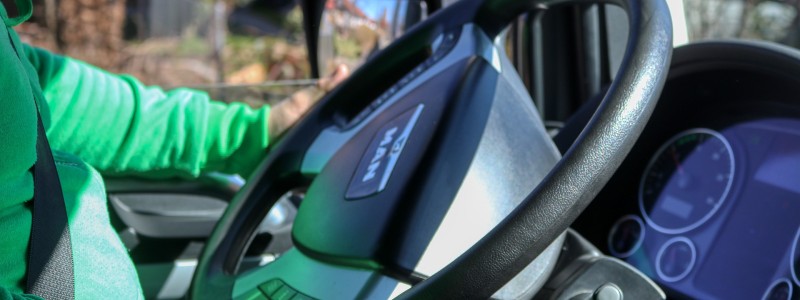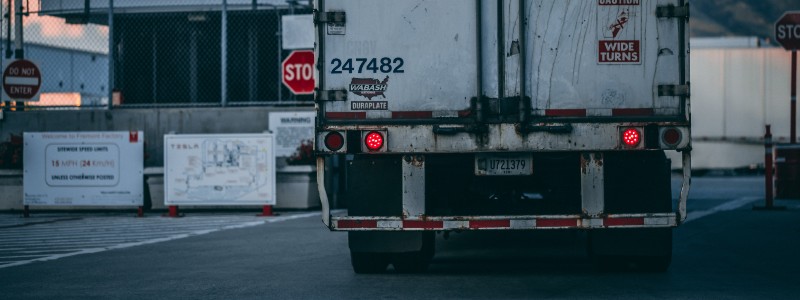Do Driver-Facing Cameras Make Semi Trucks Safer?
Driver-facing cameras are a contentious issue in the trucking industry. Semi trucks are not required to have backup cameras or dash cameras, though the industry has begun incorporating technology to make their trucks safer for everyone on the road. Unlike dash cams that watch the road in front of the truck, driver-facing cameras are installed […]

December 10, 2020

Driver-facing cameras are a contentious issue in the trucking industry. Semi trucks are not required to have backup cameras or dash cameras, though the industry has begun incorporating technology to make their trucks safer for everyone on the road.
Unlike dash cams that watch the road in front of the truck, driver-facing cameras are installed inside the cab and pointed at the truck driver. Some cameras only record when triggered by an event like hard braking or driver fatigue; others continuously record over old footage until stopped.
For some truckers, placing cameras in the cab is an enormous breach of privacy and does more harm than good. For trucking companies, driver-facing cameras may save them from paying out enormous settlements after an accident. But should they be used at all? Do they really make the roads safer for drivers? And if you are in a car accident involving a semi truck, will that footage help you?
How do Driver-Facing Cameras Help Trucking Companies?

Driver-facing cameras are a boon for trucking companies concerned about liability. If any of their fleet is involved in a serious accident, camera footage may prove their driver was not participating in risky or negligent behavior that could put them at fault.
Despite regulations on driving hours and mandatory breaks, fatigue is still a major issue for truck drivers. New cameras use face-tracking technology to predict a driver’s fatigue. Signs of drowsiness trigger the camera to start recording and notify the trucking company. Fewer drowsy drivers means fewer accidents, and less money the trucking company will have to shell out in personal injury settlements to accident victims.
Trucking companies have also begun to use wearable biometric sensors to monitor fatigue in their drivers. These technologies will hopefully reduce the amount of fatigue-related collisions, keeping the roads safer for everyone in the long run.
Do Driver-Facing Cameras Help or Hurt Truckers?

Driver-facing cameras are a point of contention for truckers, for two reasons. Firstly, while the intention is to cut down on driver distraction, there is a chance employers will use the footage to unfairly discipline drivers. Not every yawn indicates dangerous driving. Disciplinary action against the drivers will not address the inefficient system and low pay at the root of the problem.
Secondly, having a camera in the cab feels like an extreme invasion of privacy. Long haul truckers use their cab to sleep, eat, and relax: even though the footage is always recording over itself, essentially deleting as it goes, drivers can’t help but feel like their employer is always watching them even during down time.
Footage from cab-facing cameras has been used by unscrupulous companies to exploit drivers who were not actually behaving irresponsibly. In 2014 a lawsuit was filed in California against using continuous driver-facing camera footage to discipline drivers. The lawsuit was ruled in favor of employers, permitting the use of continuous footage in disciplinary actions as long as the footage was only used and seen by the employer.
On the plus side, in-cab cameras can exonerate drivers for theft or damage to the cab. Some fleets have even offered bonus incentives to drivers willing to install front facing cameras in their cabs. But the lack of privacy may outweigh any benefits.
Using Camera Footage in Personal Injury Cases

An eyewitness to an accident is very important to an accident claim, but camera footage is even better. By showing a video of exactly how the accident occurred, various stories or coverups of the accident will be eliminated. It helps protect trucking companies from false accident claims, and encourages a quick settlement if their driver is clearly at fault. Camera footage is invaluable evidence for both sides in a semi accident or other personal injury case..
Insurance companies hate losing money on large settlements. They will try as hard as they can to avoid paying – this includes not being honest about how the accident may have occurred (if the truck driver is accused of running a red light, they may say it was a yellow light instead) or even deleting footage before it can be submitted for discovery.
And these insurance companies move fast. They can have adjusters at the scene of the accident within a few hours. Speed is crucial after a catastrophic accident, as there’s always a danger the insurance company will remove evidence of their client’s wrongdoing.
You must alert your insurance to the accident as quickly as possible. If you were injured, you should get an experienced local truck accident attorney on your side. At Hensley Legal Group, our local accident attorneys work with experienced teams of reconstructionists to get to the scene of the accident before evidence like driver-facing camera footage is lost. We even have field investigators on staff that can investigate at a moments notice.
Do Driver-Facing Cameras Make the Road Safer?

For anyone who shares the road with heavy semi trucks or commercial vehicles, driver-facing cameras will likely make the road safer. Speeding, distracted driving, and fatigue are some of the leading causes of accidents and the very unsafe behaviors the cameras are meant to correct.
Cameras that only record when triggered may not be 100 percent accurate. Driver-facing cameras may only aversely affect the truck drivers themselves, and they have voiced valid concerns about the technology.
For the most part, adding cameras to trucking fleets will do nothing but make the roads safer for everyone. But for trucking companies, the goal behind installing cameras is less about safety and more about saving money on lawsuits.
Help from a Local Indiana Semi Truck Accident Attorney
Passenger vehicles are no match for a semi truck’s size or weight, and collisions often result in catastrophic injuries. If you have been in an accident with a semi truck, a local truck attorney can help you file a personal injury claim for fair compensation for your injuries. They can gather evidence and put together a case while you focus on recovery.
If you need an advocate to fight against the insurance company on your behalf, Hensley Legal Group can help. Please call us for a free consultation, or contact us online.